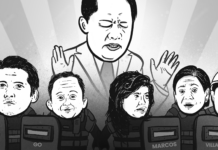FACING May 9, showbiz-crazy and
personality-oriented Filipinos are
looking more at the popular media and opinion polls to help them make the
difficult decision; they seem more concerned with being trendy, popular, and
correct, rather than being wise, concerned about the common welfare, and right.
Catholic voters have especially been ignorant
of or unconcerned about electoral guidelines issued by their bishops. The
Catholic Bishops Conference of the Philippines (CBCP) itself has warned against
making decisions based on popularity surveys:
“I say it again—be careful,” writes CBCP
president Archbishop Socrates Villegas in the March 31, 2016 CBCP letter, Lord,
Guide Us with Your Grace: Discerning for Whom to Vote in the National and Local
Elections. “Do not choose depending on who is topping or trailing in the
surveys. You are called to be authentic Catholic voters who decide from prayer
and conscience. You are called to take courage and make moral decisions.”
But like voters, like candidates. Last May 2,
only administration standard-bearer Mar Roxas and Vice President Jejomar Binay
attended the formal signing at the Manila Cathedral of the covenant for
truthful, responsible, upright, transparent and honest (Truth) elections.
In contrast, all the presidential candidates
have met with the Iglesia ni Cristo (INC) to ask for the sect’s bloc vote.
Between “Truth” and INC vote, we now know where the heart of Grace Poe, Rodrigo
Duterte, and Miriam Defensor-Santiago lies.
CBCP guidelines
Invoking the 10 Commandments, the CBCP
guidelines reiterate the Church’s injunctions against corruption, immorality,
and skullduggery. But the Varsitarian focuses on four key issues to
guide voters:
Religion is part and
parcel of public discourse. “A Catholic cannot support a candidate who
vows to wipe out religion from public life. The Catholic voter cannot and
should not lend his support to any candidate whose ideology binds him or her to
make of the Philippines a secular state that has no tolerance for religion in
its public life. Ang tunay na makabayan ay maka-Diyos.”
Therefore, politicians and policy-makers who
have sought to marginalize or even shut out the Church in key legislative and
policy-planning initiatives, such as the reproductive health (RH) law, and who
will most likely repeat it during public debates on legalizing divorce and
sanctioning homosexuality, must be rejected.
Moral teachings on sex,
marriage and family must be upheld. “The Church’s position
on marriage and human sexuality is positive and uplifting. Breaking through
both tyrannies (‘the tyranny of puritanical attitudes with misguided taboos and
the tyranny of indecency’), the Christian view of sexuality and marriage
presents the dignity and authentic freedom of single and married life that is
truly fulfilling, desirable, and fruitful.”
Therefore, the Catholic voter should reject
candidates who have passed or supported the RH law and signalled their
intention to support the legalization of divorce and same-sex marriage. Such
legislative initiatives are but a fostering of the tyranny of indecency.
Sex is neither safe nor unsafe; it is either
moral or immoral. Politicians should not contracept moral considerations in the
sexual act; they should not trivialize it and subject it to social
engineering.
“Would it not be the height of folly to strive
for greater material prosperity at the cost of violence done to personal
conscience, freedom in decision making, and the exercise of moral integrity?”
the bishops ask. “The key to the problem is not in external means of control
through mechanical and chemical contraceptives, but rather in the development
and maturation of inner mastery of one’s sexual behavior—in the chastity and
self-control demanded by the stable commitment of marriage.”
Sanctity of life must
be strictly observed. “A Catholic
voter commits a grave sin in voting for candidates who oppose the Lord’s
teachings on the sacredness of human life from conception to natural death.”
This is the key guideline. All Catholic voters
should ensure and promote respect for, nay, the sanctity of, life—from womb to
tomb. Any candidate who brags to have wiped out criminals through extra-legal
means must be rejected. Any iron-fisted candidate who vows to restore capital
punishment must be rebuffed. Any candidate who has allowed certain conditions
to obtain abetting attacks against the dignity of the person and sanctity of
life must be discarded.
The life ethic has
social dimensions. Respect for life, the protection of the sanctity of
life has socio-economic and -political dimensions. The CBCP urges voters to ask
of a candidate:
“What has the candidate done about sins
against human dignity such as subhuman living conditions, arbitrary
imprisonment, deportation, prostitution? Even degrading working conditions can
seriously threaten the quality of human life when men and women are treated as
mere tools for profit rather than as free and responsible persons. Has the
candidate done something beyond promises to protect the dignity of the poor?”
No such thing as
‘lesser evil’
Cynical or just plain indifferent, Filipino
voters may scoff at the bishops’ guidelines and say that politics is the art of
the next best, so one must settle for the lesser evil.
But the bishops, in their January 31, 2016
pastoral exhortation, Being Eucharistic in Life and Deeds, have urged
voters to settle for nothing less: “Voting for the ‘lesser evil’ is still
voting for evil.” “Not voting for a particular position when there is no one
fitted for it,” they add, “is also a valid political choice.”
The Varsitarian therefore is not endorsing any
candidate for president or vice president.
Now the front-runner in popular surveys, Davao
Mayor Duterte has been gung-ho in his public address about having executed
suspected criminals and underworld bosses and his commission of womanizing and
philandering. His supporters defend him for his candor and sincerity, and it
underscores how twisted the times are when that defense is extended to his
candor of remarking over the body of an Australian woman missionary raped and
brutalized by Mindanao terrorists: “They’ve gotten to her ahead of the mayor.
Kill them all!”
Both due to her problematic citizenship and
her inexperience, Poe is not qualified. Rather than accept her impressive
finish as Senate topnotcher in 2013 as an opportunity to learn more about
lawmaking and governance, she has interpreted it in self-serving terms as
presidential anointment. She brings to the campaign her naked ambition and
nothing more.
Even artists who have reacquired Philippine
citizenship must observe the 10-year residency rule prior to nomination (look
at the case of new National Artist for Dance Alice Garcia Reyes). But Poe has
been able to run for the Senate in 2013 and now for president without
fulfilling the rule. Her misstatement of the date of her residency has been
accepted uncritically by the Sereno court as an honest mistake.
Questions whether she’s a natural-born
Filipino have been swept under the rug by Chief Justice Sereno who came up with
the bleeding-heart argument that alleged foundlings and bastards should not be
discriminated against, as if all bastards are as nakedly ambitious as Poe as to
have the gall to run for president.
Now as then, the highest offices have been
populated by bastards, but it takes a pompous person like Sereno, herself
occupying a very high office, to have the temerity to make a legal argument
from the old adage about the kingdom of the blind: In the kingdom of figurative
bastards, the real bastard is queen.
Nuisance
Motor-mouth Santiago seems to have lost her
loquaciousness when asked about her health, her failure to take over her seat
in the International Court of Justice (for which she lobbied hard), her paltry
grade in the bar exams despite her claim of academic excellence, and why she’s
running at all and adding to the confusion of voters. She’s a nuisance
candidate; she’s the new Racuyal.
Self-proclaimed democrats and feminists like
Santiago and Poe betrayed their strongman fantasia when they supported the RH
law. Both in fact have ties to the Marcos era.
It was the dictatorship that enshrined population
control under the euphemism “family planning” in the 1973 Constitution, perhaps
the only charter to do so in world history. His enemies say Duterte would pave
the way for the return of the dictatorship. They’re wrong. The restoration of
strong-arm rule has been paved by social-engineering legislations like the RH
law, among whose supporters count nearly all of the presidential and
vice-presidential bets.
Santiago has even taken under her wing the
dictator’s son, Ferdinand “Bongbong” Marcos, as her vice president. She’s provided her own campaign as a neat
vehicle for a Marcos restoration.
In this connection, the Varsitarian urges
outright rejection of the candidacy of Marcos.
Never again
It is a sign of our worsening moral debasement
as a people that many of us look with longing to the Marcos years when
supposedly many majestic buildings and infrastructure were built while paying
lip-service to or forgetting entirely about the depredations of the conjugal
dictatorship and its cronies.
Many of us seem to have overlooked that those
buildings were built through public funds (by the taxpayers themselves) and
bilateral and multilateral loans, and no thanks to the Marcoses and their close
associates, many of those buildings were constructed defectively or weren’t
erected at all, and much of the public funds and the loans ended up in the
pockets of Marcos and his cronies and in their Swiss and other offshore
accounts. Public money and loans sucked by Marcos leeches, the Philippines was
sunk in bankruptcy. Up to now, the nation is still paying for the lost
billions!
Above all, the Marcos dictatorship
institutionalized official violence and abuse that resulted in the killings of
dissidents and innocent people, the cronyism and nepotism that continue to
bedevil our political economy, along with military corruption and adventurism,
police graft and roguery, and wanton warlordism. Martial law left the
Philippines a nation brutalized—physically, psychologically, economically,
socially, morally.
Marcos Jr. has declared he should be taken on
his own record of accomplishment. But there’s the rub. His legislative record
is pedestrian. Children coming from political dynasties hardly measure up to
the brilliance of the patriarchs: one more reason why dynasties should be
abolished.
Roxas-Robredo;
Binay-Honasan
Among the vice-presidential candidates from
the Senate, only Gregorio Honasan voted against the RH law. Representative Leni
Robredo has built a credible record as a former local official and now a
legislator. She claims to be a devout Catholic but she hasn’t really explained
how this dovetails with her rather unnuanced support for the RH law and for the
anti-discrimination bill, some of whose provisions seem to intrude into the
religious domain and even freedom of conscience.
Warts and all, however, Honasan and Robredo
appear the only acceptable options for vice president based on the CBCP’s
electoral guidelines.
Similarly, their presidential mates, Binay and
Roxas, have explained their stand on the RH law (the former is against, the
latter has qualified his support), and other issues close to the Catholic
Church, and by their gesture of signing the Truth covenant, they have emerged
as sound options for an intelligent, moral vote for the presidency.
It may be argued of course that the signing of
the Truth covenant should be pitted against the respective track record of the
signatories, a record which may not at all be that savory.
But the Varsitarian invokes the spirit of Pope
Francis’ Extraordinary Jubilee of Mercy and appeals that the signatories be
given the benefit of the doubt. Their signing must be taken as candidates’
pledge to mend their ways.
We invoke here the rule of graduality. In
Thomist language, we view the signing as the signatory’s signal to
progressively exercise acts of free will oriented toward virtue and truth.
Therefore, while refusing to endorse any one
candidate, the Varsitarian is urging voters to narrow down their choices to
these four: Roxas and Robredo; Binay and Honasan.
We pray that the Filipino voter will make the
right decision on May 9. We pray not that the best man or woman win, but that
truth prevail.













I’ve been a supporter of the Varsitarian ever since I became a Thomasian. However, this article is just too disappointing to read.
“Therefore, while refusing to endorse any one candidate, the Varsitarian is urging voters to narrow down their choices to these four: Roxas and Robredo; Binay and Honasan.”
Really? You represent the entire Thomasian community and you come up with this?
No, thank you. I’d like to vote for whomever I think this country deserves.